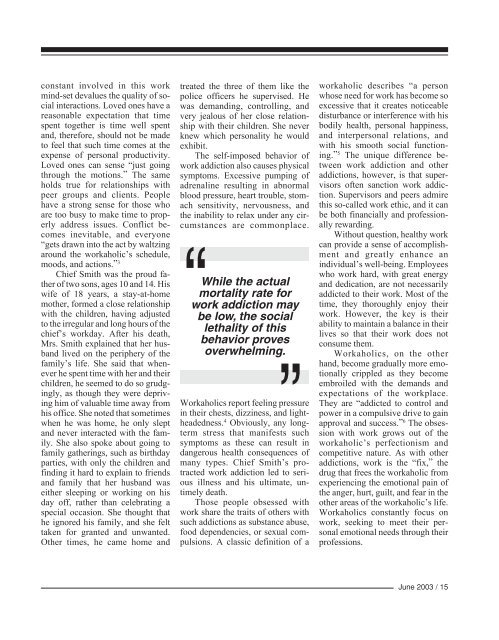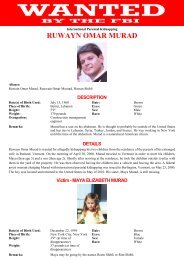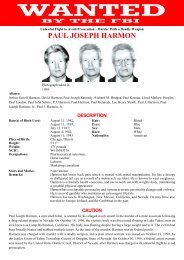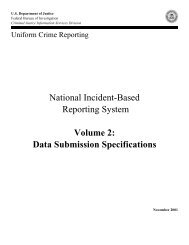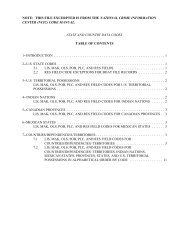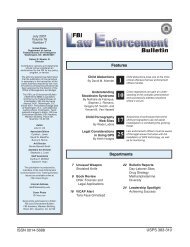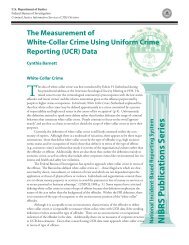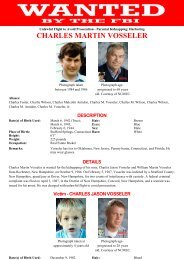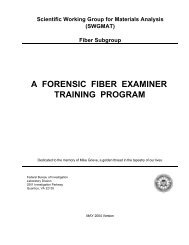F B I Law Enforcement Bulletin - June 2003 Issue
F B I Law Enforcement Bulletin - June 2003 Issue
F B I Law Enforcement Bulletin - June 2003 Issue
You also want an ePaper? Increase the reach of your titles
YUMPU automatically turns print PDFs into web optimized ePapers that Google loves.
constant involved in this work<br />
mind-set devalues the quality of social<br />
interactions. Loved ones have a<br />
reasonable expectation that time<br />
spent together is time well spent<br />
and, therefore, should not be made<br />
to feel that such time comes at the<br />
expense of personal productivity.<br />
Loved ones can sense “just going<br />
through the motions.” The same<br />
holds true for relationships with<br />
peer groups and clients. People<br />
have a strong sense for those who<br />
are too busy to make time to properly<br />
address issues. Conflict becomes<br />
inevitable, and everyone<br />
“gets drawn into the act by waltzing<br />
around the workaholic’s schedule,<br />
moods, and actions.” 3<br />
Chief Smith was the proud father<br />
of two sons, ages 10 and 14. His<br />
wife of 18 years, a stay-at-home<br />
mother, formed a close relationship<br />
with the children, having adjusted<br />
to the irregular and long hours of the<br />
chief’s workday. After his death,<br />
Mrs. Smith explained that her husband<br />
lived on the periphery of the<br />
family’s life. She said that whenever<br />
he spent time with her and their<br />
children, he seemed to do so grudgingly,<br />
as though they were depriving<br />
him of valuable time away from<br />
his office. She noted that sometimes<br />
when he was home, he only slept<br />
and never interacted with the family.<br />
She also spoke about going to<br />
family gatherings, such as birthday<br />
parties, with only the children and<br />
finding it hard to explain to friends<br />
and family that her husband was<br />
either sleeping or working on his<br />
day off, rather than celebrating a<br />
special occasion. She thought that<br />
he ignored his family, and she felt<br />
taken for granted and unwanted.<br />
Other times, he came home and<br />
treated the three of them like the<br />
police officers he supervised. He<br />
was demanding, controlling, and<br />
very jealous of her close relationship<br />
with their children. She never<br />
knew which personality he would<br />
exhibit.<br />
The self-imposed behavior of<br />
work addiction also causes physical<br />
symptoms. Excessive pumping of<br />
adrenaline resulting in abnormal<br />
blood pressure, heart trouble, stomach<br />
sensitivity, nervousness, and<br />
the inability to relax under any circumstances<br />
are commonplace.<br />
While the actual<br />
mortality rate for<br />
work addiction may<br />
be low, the social<br />
lethality of this<br />
behavior proves<br />
overwhelming.<br />
“<br />
”<br />
Workaholics report feeling pressure<br />
in their chests, dizziness, and lightheadedness.<br />
4 Obviously, any longterm<br />
stress that manifests such<br />
symptoms as these can result in<br />
dangerous health consequences of<br />
many types. Chief Smith’s protracted<br />
work addiction led to serious<br />
illness and his ultimate, untimely<br />
death.<br />
Those people obsessed with<br />
work share the traits of others with<br />
such addictions as substance abuse,<br />
food dependencies, or sexual compulsions.<br />
A classic definition of a<br />
workaholic describes “a person<br />
whose need for work has become so<br />
excessive that it creates noticeable<br />
disturbance or interference with his<br />
bodily health, personal happiness,<br />
and interpersonal relations, and<br />
with his smooth social functioning.”<br />
5 The unique difference between<br />
work addiction and other<br />
addictions, however, is that supervisors<br />
often sanction work addiction.<br />
Supervisors and peers admire<br />
this so-called work ethic, and it can<br />
be both financially and professionally<br />
rewarding.<br />
Without question, healthy work<br />
can provide a sense of accomplishment<br />
and greatly enhance an<br />
individual’s well-being. Employees<br />
who work hard, with great energy<br />
and dedication, are not necessarily<br />
addicted to their work. Most of the<br />
time, they thoroughly enjoy their<br />
work. However, the key is their<br />
ability to maintain a balance in their<br />
lives so that their work does not<br />
consume them.<br />
Workaholics, on the other<br />
hand, become gradually more emotionally<br />
crippled as they become<br />
embroiled with the demands and<br />
expectations of the workplace.<br />
They are “addicted to control and<br />
power in a compulsive drive to gain<br />
approval and success.” 6 The obsession<br />
with work grows out of the<br />
workaholic’s perfectionism and<br />
competitive nature. As with other<br />
addictions, work is the “fix,” the<br />
drug that frees the workaholic from<br />
experiencing the emotional pain of<br />
the anger, hurt, guilt, and fear in the<br />
other areas of the workaholic’s life.<br />
Workaholics constantly focus on<br />
work, seeking to meet their personal<br />
emotional needs through their<br />
professions.<br />
<strong>June</strong> <strong>2003</strong> / 15


